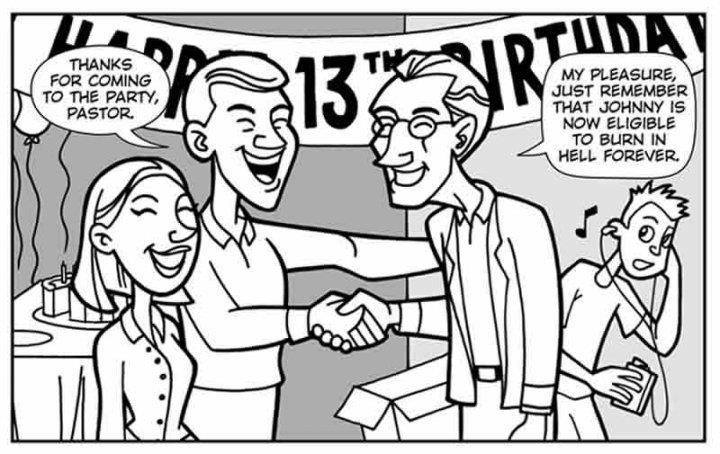
If the doctrine of original sin is true, and everyone is born with a sinful nature and a rebel towards God, what happens to babies who die? Do babies go to hell? Do they go to heaven?
Do they go someplace in between?
Augustine of Hippo said babies go to hell for eternal punishment, but added that they get a mild sort of punishment. If there’s such a thing. The following comes from the Catholic Encyclopedia:
St. Augustine and the African Fathers believed that unbaptized infants share in the common positive misery of the damned (i.e., hell), and the very most that St. Augustine concedes is that their punishment is the mildest of all.
Eight hundred years after Augustine, a French philosopher named Peter Abelaard (1079–1142) said dead infants went to a cooler place on the edge of hell. He called this place the Limbo of Infants. (The word limbo comes from the Latin word limbus meaning edge.)
“But Paul, I don’t want my child to go to hell or even the edge of hell. What can I do?”
Fear not. Augustine offers a way out: “An infant’s original sin is remitted through baptism.”
Bingo!
If you have ever wondered why Catholics, Lutherans, Presbyterians, Moravians, and others baptize their babies, this is why. A sprinkle of water and voila, your child has a get-out-of-hell-free card.
Infant baptism, the cure for your baby’s sin
In the Catholic Church infants are baptized or sprinkled within a few weeks of their birth, but sometimes the ritual is not performed until they are six months old. So infant baptism offers no relief to those who have lost newborn babies.
I have friends who lost their precious son shortly after he was born. It was a heartbreaking tragedy. But at least they weren’t fed Augustine’s line about babies going to hell.
In fairness, many Catholics don’t agree with either Augustine or Abelaard. In its 1980 “Instruction on Children’s Baptism”, the Congregation for the Doctrine of the Faith reaffirmed that: “with regard to children who die without having received baptism, the Church can only entrust them to the mercy of God.”
Trusting a lost child to the mercy of God is a lot more compassionate that condemning them to hell.
The Lutherans have a similar view to the Catholics. They do not know what happens to unbaptized infants but they trust God has it figured out:
There is some basis for the hope that God has a method, not revealed to us, by which he works faith in the children of Christians dying without baptism (Mark 10:13–16). For children of unbelievers we do not venture to hold out such hope. We are here entering the field of the unsearchable judgments of God (Romans 11:33).
You have to give the Lutherans credit for abandoning Augustine’s damnable diagnosis, but they lose marks for condemning the children of the unsaved and for being uncertain about the will of God.
Some Protestant denominations practice infant baptism, but others don’t. How do those in the second group deal with hell-bound babies? Most give them a free pass until they reach the age of accountability.
Until the child reaches an age where they are accountable for their actions, the thinking goes, God will not hold them responsible for their sin.
The age of accountability myth
How old does a child need to be before they become accountable? Nobody knows. Some say seven years, others say ten, but definitely by the age of thirteen.
What if the child is a late bloomer, has Downs Syndrome, or is otherwise different?
These are the questions that keep theologians busy writing books, but the short answer is nobody knows. And the reason nobody knows is because the age of accountability is a manmade solution for a manmade problem.
Like Augustine’s doctrine of original sin, the age of accountability teaching is not found in the Bible. It’s a fiction.
Although there are scriptures that speak of children being too young to know the difference between good and evil, there is nothing to suggest that God gives grace to kids for a limited time only.
The truth is God gives grace to all of us, young and old alike. Because of Jesus, not even adults are held accountable for their sins (2 Cor. 5:19). We are not judged by how good or bad we are. We are judged by our response to Jesus.
Artist unknown
So what happens to babies who die? Do babies go to hell on account of original sin?
This question has led to much confusion and hand-wringing. It has caused some to abandon the faith (because God is cruel) and others to embrace universalism (because a good God could never do this). Uncertainty over their children leaves parents riddled with anxiety and prone to deception.
Bad questions usually lead to bad places.
The gospel for babies
What would Jesus say if he was asked about babies and young children? He would say “the kingdom of God belongs to such as these” (Luke 18:16).
However, because we have swallowed so much religious mumbo-jumbo we doubt whether the kingdom really does belong to such as these.
We have been fed the Augustinian lie that babies are bad to the bone. We’ve heard the Calvinist trollop that infants are depraved little sinners.
Some say that babies will be judged according to the light of their revelation. But how much revelation does a new-born have? What about a miscarried baby?
Others say God looks into the baby’s future and judges them for what they would’ve done. This is absurd. The baby died. They didn’t do anything. How can a just God judge them for what they didn’t do?
The problem with these silly scenarios is they define faith as something you must do, while unbelief is doing nothing at all. Since babies do nothing, they must be unbelievers. But this is back to front. In the Bible unbelief is described as a work and faith is a rest.
What happens to babies and children who die young? They go to be with Jesus.
Every. Single. One.
If you have lost an infant or child, you can be 100 percent certain about this. Don’t listen to those comfortless frowners who say your child is lost, but trust the One who said his kingdom belonged to such as these.
It is a mistake to say babies are rebels, but it’s also incorrect to say babies are righteous and holy. So how do we deal with verses that say things like “without holiness no one will see the Lord” (Heb. 12:14)? We don’t. We give those verses to God and trust him to figure it out.
Like the Catholics and Lutherans we entrust our unbaptized babies to the mercy of God.
Happily, God’s mercy is vast beyond all comprehension. His mercy trumps any judgment that may come against our children (Jas. 2:13).
If we could see heaven right now we would find that it is full of the lost children of earth – deceased babies, HIV babies, aborted babies, and miscarried babies. I don’t know what age they are in heaven, but I know they are there.
How do I know? Because if grace is for anyone, it is for babies and children such as these.
—–
Extracted and adapted from Paul’s ebook, Original Sin: What Does the Bible Really Say? available now on Patreon, along with these great titles:
Having trouble logging into Patreon? Read this. Issues with a declined card? Read this.













